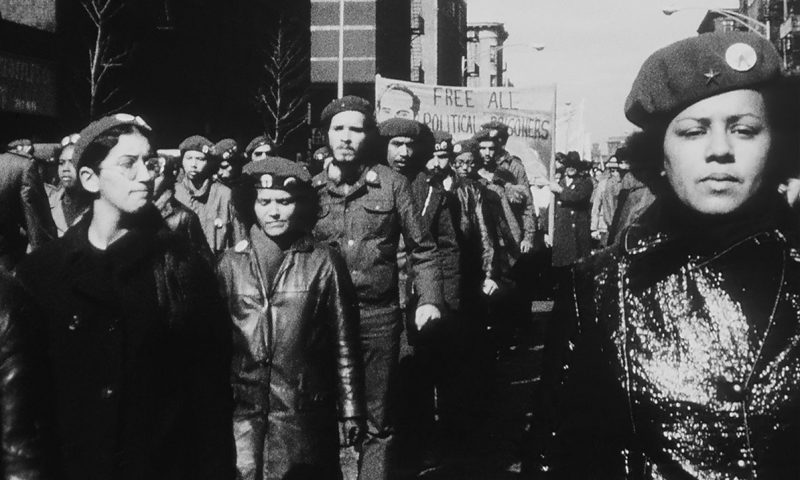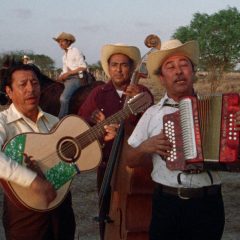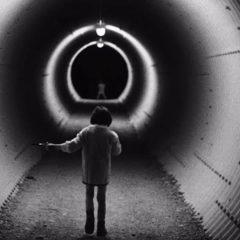One of America’s most seductive and dangerous myths is that her continued progress is not only merited but somehow guaranteed. The so-called Democratic “Blue Wave,” prophesied to wash away our sins later this year, is just one manifestation of this deeply-rooted fantasy.
Within this context, Newsreel ‘68 is a much-needed splash of cold water directly to the face. A three-part program, curated out of New York by Third World Newsreel, with additional screenings of other Newsreels at Lightbox on August 23 and September 20, the series presents archival documentary vignettes, from the activist film collective NEWSREEL, profiling various protest movements of the late 1960s and early ‘70s. While tributes to this era often treat its hard-fought social gains as part of some natural progression — the inevitable frontier of America’s moral Manifest Destiny — these films, both individually and as a group, paint a much messier picture of change on the ground.
That the injustices NEWSREEL highlighted some 50 years ago continue to plague our society (from the war-mongering of the US government to anti-black racism, police brutality and the threat of eminent domain) makes the experience of their films in 2018 not only painfully sobering but potentially instructive.

The More Things Change
Summer ‘68 (Newsreel #505), the first and longest of the four reels screened late last month during Program 1, follows a group of anti-draft organizers as they travel from New England to Chicago for the 1968 Democratic National Convention. Rather than focusing solely on the turmoil erupting in the streets, Summer ‘68 spends much of its time in paper-strewn back-rooms listening in on its cast of shockingly young (to my 30-something eyes), overwhelmingly male, mostly white and mostly middle-class protagonists. Punctuated by intense tactical disagreements and occasional grandstanding, these behind the scenes moments often feel like the wargames of well-meaning children, and I couldn’t help but reflect on how much of history is shaped by people who are essentially making it up as they go along.
In one clip, a baby-faced college student from the Boston Draft Resistance Group (BDRG) recounts his failure, despite spending six months agitating on a factory line, to convince a single one of his working class peers to oppose the war in Vietnam. Moments later, upon arriving in Chicago, his fellow organizer expresses relief at being accepted into the throng: “For once,” he explains “we felt we were the people.” The class anxieties apparent in these confessions also surface in frequent debates about the comparative merits of respectability and radicalism. “We had come to expose the (Democratic) party we held responsible for the war and racism and to demonstrate our opposition,” explains one narrator, as a team of organizers crowds around a map of the convention center and the planned protest route. “But in spite of all our planning, the actions open to us were still limited — conventional.” These are kids, born in relative proximity to the levers of power, coming to terms with the reality that, in the eyes of the state and the conventional press, there is no way to be both legitimate and outraged.
Fighting the Power
By contrast, the men and women featured in Newsreel #19 (Black Panther aka Off the Pig) are faced with no such dilemma. Unlike the draft resisters (and members of faith-based civil rights organizations of the time), the Panthers famously rejected the pretext of respectability in favor of direct action. Off the Pig, which opens with a steady drumbeat played over still photographs of police violence and a pan of the bullet-riddled storefront window at the Panther’s Oakland headquarters, shows a highly centralized and image conscious organization run like a well oiled machine. The messaging from Eldridge Cleaver, Huey P. Newton and others is powerful and comprehensive in its structural analysis — linking colonialism and the war in Vietnam to anti-black racism and police brutality in the United States. There is, in my opinion, no clearer testament to how little this country’s political will has shifted in the past half-century than that this framework, already clearly articulated in the ‘60s, remains at the fringes of mainstream discourse.
The Case Against Lincoln Center (Newsreel #17) evocatively cuts together long shots of the empty, antiseptic halls of Manhattan’s Lincoln Center and vibrant street scenes from the predominantly Latino neighborhood that was razed (under the pretext of slum clearance) in order to build it. While children paint, hula hoop and play ball near stoops overflowing with music, an omniscient narrator reminds us (in Spanish) of the true cost of what she calls a “monument to private indulgence,” funded with money from the tax exempt foundations of the über-rich. Despite its title, this brief, impressionistic film, which was completed near the very end of the center’s construction, is less a record of active resistance and more an epitaph to what is lost when the Powers That Be go unchecked. In the context of the evening’s program, the fact that the voice connecting these dots was also seemingly a female one was a refreshing change of pace from so much male speechifying.
Bending the Arc
In fact, women were seldom seen and even more seldom heard throughout Newsreel ‘68 Program 1. Kathleen Cleaver, future legal scholar and former spouse of Panther leader Eldridge Cleaver, cuts a silent, afroed profile at several points during Off the Pig. Elsewhere, a band of women stands outside a California courthouse chanting and clapping in perfect unison: “No more brothers in jail… the pigs are gonna catch hell.” The young white women of the draft resisters group fare even worse in Summer ‘68, appearing on screen only to listen attentively or to serve spaghetti to the group while a male narrator explains the importance of collectivity. I wonder what these women knew but did not say. I wonder what they said that was not heard. I also wonder if I’ll live to see a (non-gender-based) movement that treats femmes as anything other than emotional support staff.
History is never written in stone and America’s current crisis is necessarily rewriting how we understand the achievements of the 1960s. While I left the International House’s Ibrahim Theater feeling rather despondent, I was also bolstered by the knowledge that independent media has a role to play in a society trying to get free. If the moral arc of the universe is long, we need a people’s archive to remind us that it only bends towards justice if we bend it.
Newsreel ‘68 Program 2, Thursday, August 23, at 7 PM, features Columbia Revolt (Newsreel #14), and El Pueblo Se Levanta (The People Are Rising) (Newsreel #63).
Newsreel ‘68 Program 3, Thursday, September 20, at 7 PM features People’s War (Newsreel #43), Young Puppeteers of Vietnam, and a conversation with author Daniel Denvir.
All screenings at Lightbox Film Center.









